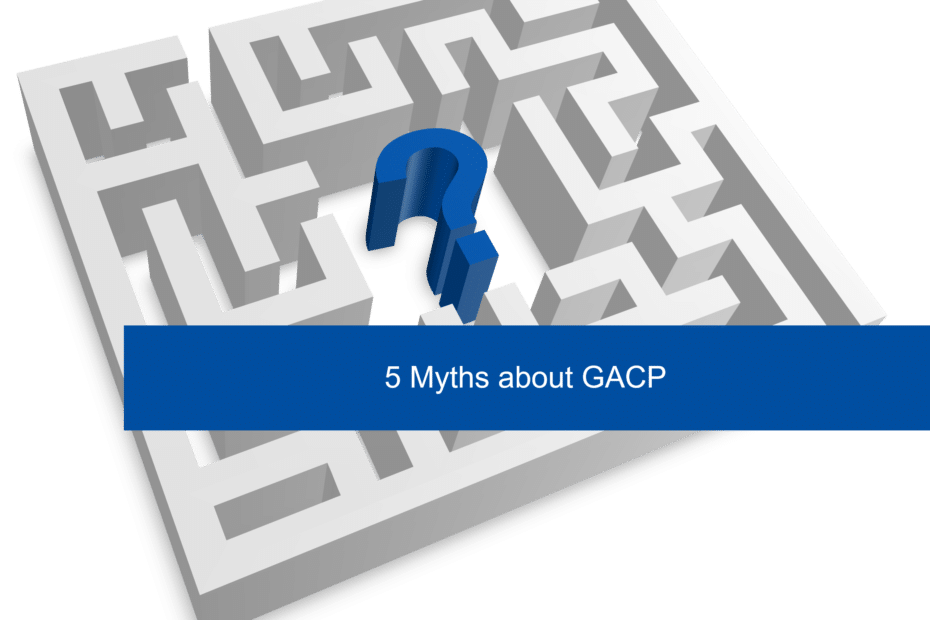Being involved in countless projects and client interactions regarding questions to GACP, the following 5 most prominent myths are explained.
Myth 1 – I can use my plant clones over and over again
Myth 2 – I am growing my plants on soil and thus it must be compliant
Myth 3 – GAP and Global GAP are equivalent to GACP
Myth 4 – GACP does not require a Quality Management System (QMS)
Myth 5 – I can stamp my products with “compliant to GACP”
First of all, and before busting any myths, it must be understood that Good Agricultural and Collection Practice (GACP) is understood as a sub-division of GMP and thus, GACP guidelines should be read in conjunction with GMP guidelines. Moreover, herbal substances, the result of primary processing of plant material, as named in the GACP guidelines are understood to be equivalent to herbal drugs, as named in the European Pharmacopeia in the general chapters 1433 and 1434, and thus, fall under GMP. Moreover, EU GMP Annex 7 defines the requirements, based on Regulation 1252/2014 and Directive 2003/94/EC, for the manufacture of herbal medicinal products, the preparations which are ready to use and often sold via pharmacies. Thus, GACP undoubtedly belongs to the pharmaceutical set of guidance and regulations.
Myth 1 - BUSTED
I can use my plant clones over and over again
Whether it is a myth or not to use over and over clones of a mother plant and remain compliant to GACP depends highly on the mother plant genetics and the way of cloning. Analytics and determination of the wild type of the plant used to derive clones must be identified and controlled under GACP. Mutations might occur which might have an affect on the herbal substance, leading to variation in the final product and thus, to a non-conformity of that said product. So, using the same mother plant over and over to clone from that plant must be observed by adequate analytical and other methods to determine to which extend potential mutation alters the consistency and quality of the final herbal product.
Myth 2 – BUSTED
I am growing my plants on soil and thus it must be compliant
Soil is a mixture of many ingredients and under GACP the soil should be controlled adequately. So, if just using the soil form the same supplier wont help in this as no analytical control might be established at the supplier. Specifically, the soil should be adequately described and controlled not only at incoming stage but over the entire life-cycle of the plant growth. Thus, depletion of vital minerals in the soil might occur and must be understood if needed to top up or only measured. Specifically, any contaminants need to be identified and removed if prone to be taken up by the plant.
Myth 3 – BUSTED
GAP and Global GAP are equivalent to GACP
The term used in both US and EU GMP is Good Agricultural and Collection Practice, short GACP. There is no such thing as GAP (unless you are thinking of apparel) or even global GAP, as there is no harmonization on a global scale for GMP and more specifically GACP. So, being certified according global GAP or GAP might either be a false interpretation of the GACP or a hoax. Be alerted if your supplier boasts with GAP and global GAP certification.
Myth 4 – BUSTED
GACP does not require a Quality Management System (QMS)
GACP, as a subpart of GMP, does clearly require a Quality Management System (QMS), often referred to as Pharmaceutical Quality System (PQS). Without a PQS, it is difficult to demonstrate by objective evidence that process have been described, implemented and followed. Further, a manufacturer under GACP should expect to be audited by both the competent authorities as well as by the clients according GACP guidelines and GMP regulations depending on their use of the plant material. Without a PQS implemented, the audit will most like result in major findings by the auditor if not suspended from the beginning.
Myth 5 – SEMI-BUSTED
I can stamp my products with “compliant to GACP”
This is actually not so easy to answer as the correct answer would be “it depends”. In the case that there is a PQS implemented and the product is sold under GACP for further use in a medicinal product, the product is rated as raw material for the further processing under GMP. Only finished products, ready to be sold to the final user are subject to market authorization by the competent authorities. Raw materials must be compliant to the specification of the client and thus, need a Certificate of Analysis (CoA) along to the Certificate of Compliance (CoC) to the client’s specifications. Compliance to GACP is demonstrate in audits for the PQS but not certified on a product level. So, stamping the product with “compliant to GACP” is only valid for the PQS but not for the sold product itself.
How Avanti Europe can help
Avanti Europe’s Experts have a decade-long track record and expertise in consulting and contracting to the Pharma industry and specifically to Phytopharmacy. Our experts support your company with hands-on workforce and support the definition of the QMS, processes, the documentation, training for the company staff, and audits for Pharmaceutical QMS, Phytopharmaceutical QMS and Supplier audits. Visit our online shop for checklists and other services.
